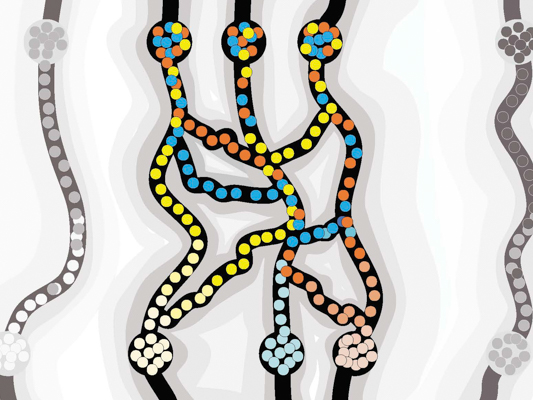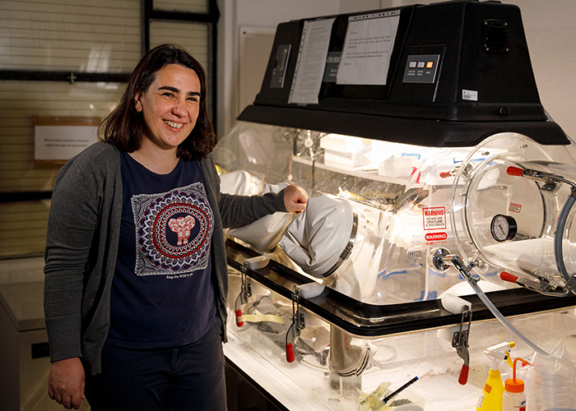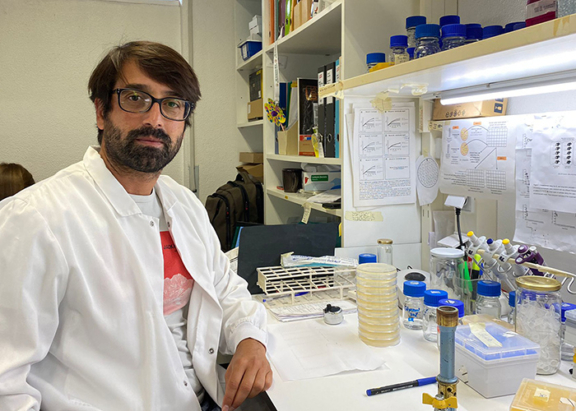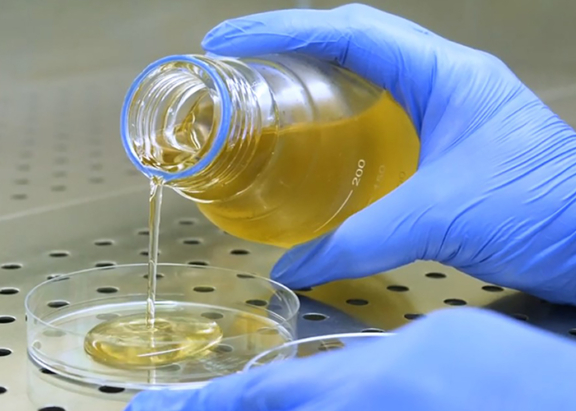
Evolutionary Biology
Isabel Gordo
The area of research of the group led by Isabel Gordo is microbial evolution. The research group combine both theoretical and empirical work with the aim at a better understanding of the major forces that shape variation in bacterial populations.
Present and future projects of the research team include:
Determine the the cost of antibiotic resistance and the level of epistatic interactions on fitness between resistant mutations and the underlying mechanisms causing such epistasis.
Member

Projects
In this project we aim at determine the speed and mode of adaptation of a common commensal bacteria in its natural environment. We use different strains of mice and strains of E. coli to unravel the dynamics of adaptation in these complex ecosystems. We are interested in understanding the role of host genetics in shaping bacterial adaptation in microbiomes.
Even with the success of antibiotics, the rapid evolution of multiple antibiotic resistances constitutes an increasing health problem. We are studying the importance of genetic interactions in the evolution of antibiotic resistance. In particular the costs of multiple resistance and the rate of mutations which can compensate for resistance costs, need to be better understood in natural microbial ecosystems, which are characterised by a multitude of biotic interactions and rapid evolution. We are using modelling and in vivo experimental evolution to address this issue.
Publications
- Nelson Frazão, Anke Konrad, Massimo Amicone, Elsa Seixas, Daniela Güleresi, Michael Lässig and Isabel Gordo (2022) Two modes of evolution shape bacterial strain diversity in the mammalian gut for thousands of generations. Nature Communications 13
- Hugo C. Barreto, Beatriz Abreu, Isabel Gordo (2022) Fluctuating selection on bacterial iron regulation in the mammalian gut. Current Biology
- Amicone M., Borges, V, Alves, M.J., Isidro, Zé-Zé, J.L., Duarte, S., Vieira, L. , Guiomar, R. , Gomes, J.P., Gordo I. (2022) Mutation rate of SARS-CoV-2 and emergence of mutators during experimental evolution.. Evolution, Medicine, and Public Health
- Balbontín, R., Frazão, N., Gordo, I. (2021) DNA Breaks-Mediated Fitness Cost Reveals RNase HI as a New Target for Selectively Eliminating Antibiotic-Resistant Bacteria. Molecular Biology and Evolution msab093
- Cardoso, LL., Durão, P., Amicone, M., Gordo, I. (2020) Dysbiosis individualizes the fitness effect of antibiotic resistance in the mammalian gut. Nature Ecology & Evolution 1-11
- Frazão, N., Sousa, A., Lässig, M., Gordo, I. (2019) Horizontal gene transfer overrides mutation in Escherichia coli colonizing the mammalian gut. PNAS. 116 (36):17906-17915
- Sousa, A., Frazão, N., Ramiro, R.S., Gordo, I. (2017) Evolution of commensal bacteria in the intestinal tract of mice.. Curr Opin Microbiol. 38:114-121
- Moura de Sousa, J., Balbontín, R., Durão, P. , Gordo, I. (2017) Multidrug-resistant bacteria compensate for the epistasis between resistances. PLoS Biol. 15 (4):e2001741
- Sousa, A., Ramiro, R.S., Barroso-Batista, J., Güleresi, D., Lourenço, M., Gordo, I. (2017) Recurrent reverse evolution maintains polymorphism after strong bottlenecks in commensal gut bacteria.. Mol Biol Evol. msx221
- Durão, P., Güleresi, D., Proença, J., Gordo, I. (2016) Enhanced survival of Rifampicin and Streptomycin double resistant E. coli inside macrophages.. Antimicrob Agents Chemother. 60(7):4324-32
- Barroso-Batista, J., Demengeot, J., Gordo, I. (2015) Adaptive immunity increases the pace and predictability of evolutionary change in commensal gut bacteria. Nat Commun. 6:8945
- Barroso-Batista, J., Sousa, A., Lourenço, M., Bergman, M-L., Sobral, D., Demengeot, J., Xavier, K.B., Gordo, I. (2014) The first steps of adaptation of Escherichia coli to the gut are dominated by soft sweeps.. PLoS Genet. 10(3):e1004182
- Miskinyte, M., Sousa, A., Ramiro, R.S., de Sousa, J.A.M., Kotlinowski, J., Caramalho, I., Magalhães, S., Soares, M.P., Gordo, I. (2013) The genetic basis of Escherichia coli pathoadaptation to macrophages.. PLoS Pathog. 9(12):e1003802
- Sousa, A., Magalhães, A., Gordo, I. (2012) Cost of antibiotic resistance and the geometry of adaptation.. Mol Biol Evol. 29(5):1417-28
- Trindade, S., Sousa, A., Xavier, K.B., Dionisio, F., Ferreira, M.G., Gordo, I. (2009) Positive Epistasis Drives the Acquisition of Multidrug Resistance. PLoS Genet. 5(7):e1000578
- Perfeito, L., Fernandes, L., Mota, C., Gordo, I. (2007) Adaptive Mutations in Bacteria: High Rate and Small Effects.. Science. 317(5839):813-5



